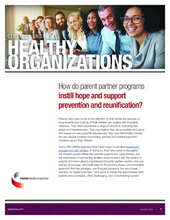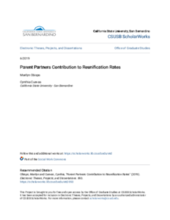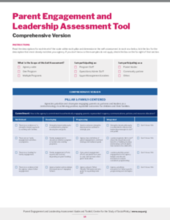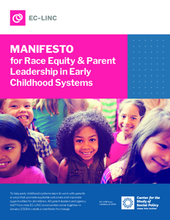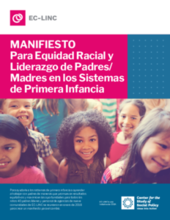This section highlights resources focused on the participation of parents and caregivers in decisions about children's care, including decisions about their own children and their placement in alternative care, as well as advocacy efforts to reform systems of care and protection for children.
Displaying 51 - 60 of 98
This Casey Family Programs issue brief looks at the use of peer mentors (“parent partners”) who work with parents entering in and engaging with the child welfare system.
The following research study aimed to discover the relationships and contributions that parent partners have in the reunification process of parents and children within the child welfare system.
The current study used a quasi-experimental design and propensity score matching to examine the outcomes for children of families served by the Iowa Department of Human Services Parent Partner program, a peer support program to mentor parents who are currently involved in the US child welfare system.
This study utilizes a quasi-experimental propensity score matching design to assess the causal impact on child welfare outcomes when parents facing an abuse or neglect case in the New York City Family Court were provided interdisciplinary law office representation as opposed to a standard panel attorney.
This report from the Parliamentary Assembly of the Council of Europe looks at the right of donor-conceived persons to know their origins in a global context where more than 8 million children worldwide have been born as a result of assisted reproductive technologies.
According to this report, children of prisoners in the UK are an "'invisible’ group – currently, children are not systematically identified or assessed when a parent goes to prison." The report aims to improve understanding of: who this ‘invisible’ group of children is; the extent, nature and root causes of their poorer outcomes; and how a whole family approach can be used to improve outcomes for children and parents and what needs to change.
This resource is designed to help agencies, systems, and collaboratives working with young children and their families to chart a course toward an expanded approach to family engagement.
This chapter of the Routledge Handbook of Critical Social Work, written by David Tobis, examines an inspiring story of dramatic change in New York’s child welfare system and how parents whose children were in foster care contributed to those changes. It demonstrates how grassroots activism can be suggestive for critical social work.
To help early childhood systems in the U.S. learn to work with parents in ways that promote equitable outcomes and maximize opportunities for all children, 40 parent leaders and agency staff from nine Early Childhood Learning and Innovation Network for Communities (EC-LINC) communities came together in January 2018 to create a manifesto for change.
Para ayudarle a los sistemas de primera infancia en los E.E.U.U. a aprender a trabajar con padres de maneras que promuevan resultados equitativos y maximicen las oportunidades para todos los niños 40 padres líderes y personal de agencias de nueve comunidades de Early Childhood Learning and Innovation Network for Communities (EC-LINC) se reunieron en enero de 2018 para crear un manifiesto para el cambio.

